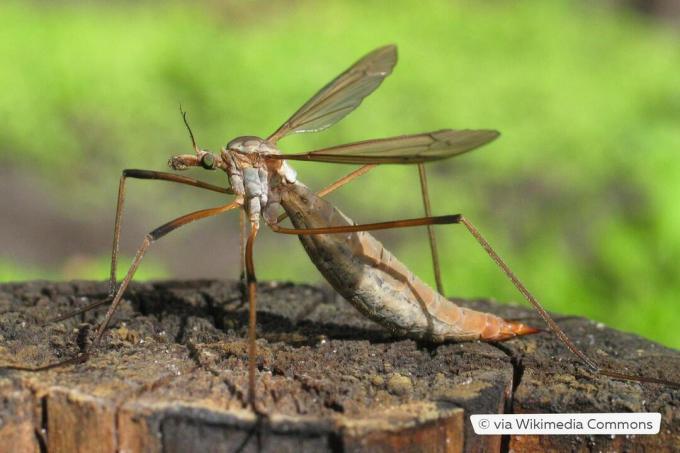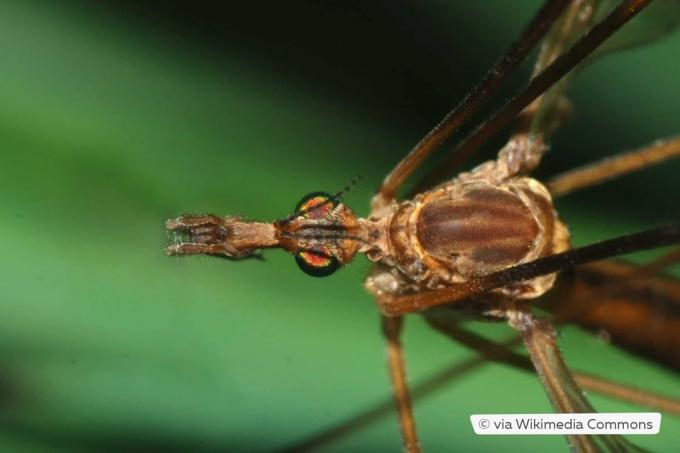
Meadow gnats first appear through damage to lawns. Brown spots are a sign that mosquito larvae are at work. Can gnats sting or bite?
In a nutshell
- Meadow cranefly Collective term for several species of cranefly
- causes damage to the lawn
- multiplies strongly in humid weather
- adult animals harmless
- belongs to the mosquitoes, but cannot bite
Table of contents
- recognize meadow cranes
- lawn pests
- Do gnats sting?
- frequently asked Questions
recognize meadow cranes
species Tipula paludosa are referred to as meadow or swamp cranes. They belong to the family of gnats (Tipulidae) and represent a suborder of mosquitoes represent.

Source: Holger Gröschl, Tipula paludosa7, Edited from Plantopedia, CC BY-SA 2.0 DE
The larvae are feared as pests in the garden. The adult animals are annoying because they appear in swarms and like to fly through open windows into the lighted apartment in the dark. However, they do not cause any significant damage.
identify larvae
| Look | way of life |
|---|---|
| - four inches long – grey-brown – somewhat thinner than grubs – "Devil's face" on the abdomen |
– hatches from egg after four to six weeks – overwinters in the ground – lives next to the turf – particularly active in spring – eats grass roots and blades - nocturnal |
A notice: The so-called "devil's face" is a locomotion organ of the larvae that looks like a face. It replaces the legs.
Adult specimens
| Look | way of life |
|---|---|
| – elongated body – about two centimeters long – cylindrical abdomen – 16 millimeter long wings – six long, thin legs – brown coloring |
– prefers areas with a closed grass cover as a habitat – Lives in meadows and pastures as well as on lawns in gardens - Egg-laying in autumn |
Tip: Crane gnats appear in swarms and can severely disrupt spending time outdoors in the evening. Also keep the windows of lighted rooms closed to prevent unwanted guests from visiting.
lawn pests
Tipula larvae cause damage in agriculture and in the home garden, especially in the lawn at. After mild winters, meadow gnats can appear in masses.
symptoms of an infestation

- Yellow or brownish, mostly circular areas in the lawn
- dead grass
- continuous yellowing of the culms
A notice: Also many blackbirds on the lawn can be an indication of an infestation. They happily peck at the larvae there.
Do gnats sting?
Meadow or swamp gnats look like large mosquitoes, but they cannot sting. You don't have a lancing device. You don't have to worry about a mosquito bite either. With their soft mouthparts, insects cannot penetrate human skin. They can only soak up liquids such as water and nectar.

Source: alvesgaspar, Tipulidae April 2008-1, Edited from Plantopedia, CC BY-SA 3.0
A notice: All species of mosquitoes are harmless to humans and pets.
frequently asked Questions
Circular, dead grass areas indicate infestation with crane flies. When the larvae of the crane flies eat the roots of the grass, the blades of grass turn yellow throughout. On the other hand, if a fungal disease causes the damage, irregular spots on the stalks are the result.
Use nematodes of the Steinernema carpocapsae variety to control the larvae of the crane fly. Nematodes are roundworms. They penetrate the larvae as parasites and kill them. Nematodes do not pose any danger to humans or pets. Between April and September is the best time to use the roundworms. At this time there are many larvae in the soil.
Occasionally roll the lawn with a spiked roller. This will ventilate the area. The best time is when it has rained after a long drought. Roll back and forth.
Alternatively, you can sprinkle 30 grams of calcium cyanamide per square meter. In this way, pests are reduced and the lawn is supplied with nutrients at the same time.
Prevent the gnats from laying eggs in late summer with a thin, translucent fleece cover.
